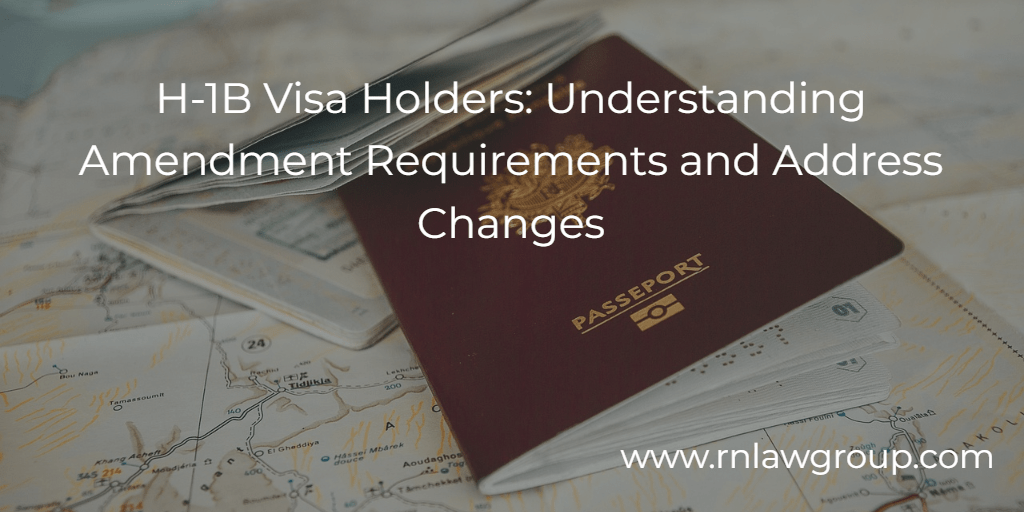
H-1B Visa Holders: Understanding Amendment Requirements and Address Changes
Filing an H-1B amendment petition with the U.S. Citizenship and Immigration Services (USCIS) is a critical step for employers to ensure compliance with immigration laws. Understanding when an amendment is required can help avoid legal complications and maintain the lawful status of nonimmigrant employees. This article delves into the specifics of when an amendment is necessary and provides detailed examples to illustrate various scenarios. Additionally, it covers the requirement to file Form AR-11 for change of address notifications.
Why Amendments are Necessary
Amendments to H-1B petitions are required when there are material changes to the terms and conditions of the employment of an H-1B nonimmigrant. Material changes can impact the basis on which the original petition was approved, such as job location, duties, salary, or the employer’s corporate structure. These changes need to be reported to USCIS to ensure that the employment remains in compliance with the requirements set forth in the H-1B visa regulations.
Key Scenarios Requiring Amendments
Change in Job Location
Example: An H-1B employee initially works in New York City but is transferred to the company’s office in San Francisco.
A change in the worksite location that falls outside the metropolitan statistical area (MSA) of the originally approved location necessitates an amendment. This is because the prevailing wage, cost of living, and working conditions can significantly vary from one location to another, affecting the terms of the labor condition application (LCA) that was certified for the original location. Failure to file an amendment in such cases can result in non-compliance with the wage requirements and lead to potential penalties.
Detailed Process:
- Filing a New LCA: Before the amendment, the employer must file a new LCA for the new location and ensure it complies with the prevailing wage standards.
- Submitting Form I-129: The amended Form I-129, Petition for a Nonimmigrant Worker, must include the new LCA and details of the location change.
- Transitioning Work: The employee can begin working at the new location after the amendment is filed, provided it is done in a timely manner and the new conditions are compliant with H-1B regulations.
- Change in Job Duties
Example: An H-1B employee hired as a software developer is promoted to a project manager role with significantly different responsibilities and SOC Code.
If the core job duties of the nonimmigrant worker change substantially, an amendment is required. The new position must still qualify as a specialty occupation and the employee must possess the necessary qualifications for the new role. This ensures the position meets the requirements set forth by USCIS for an H-1B visa holder.
Detailed Process:
- Evaluating the New Role: Determine if the new job duties still qualify as a specialty occupation.
- Filing an LCA: If the new role requires a different prevailing wage, a new LCA must be filed.
- Amending Form I-129: Submit an amended Form I-129 with updated job duties and qualifications.
- Maintaining Status: The employee can continue working in the new role once the amendment is filed and pending approval, ensuring there are no gaps in compliance.
- Change in Employer’s Corporate Structure
Example: The H-1B employer undergoes a merger, and the employee’s work now falls under a different entity.
When the petitioning employer undergoes significant corporate restructuring, such as a merger, acquisition, or spin-off, it affects the H-1B employment, necessitating an amendment. This ensures USCIS has accurate information about the new employer entity and verifies that the employment terms remain consistent with H-1B regulations.
Detailed Process:
- Notifying USCIS: Inform USCIS about the corporate restructuring.
- Filing the Amendment: Submit an amended Form I-129 with details of the corporate change.
- Continuing Employment: Employees can continue their work with the new entity once the amendment is filed, provided all other terms of employment remain consistent with the initial petition.
- Material Change in Employment Terms
Example: The employee’s salary or working hours are significantly altered.
Any significant changes to the terms and conditions of employment initially described in the H-1B petition must be reported through an amendment. This includes changes in salary, work hours, job duties, or other employment conditions. Maintaining compliance with the LCA and H-1B requirements is crucial for the lawful employment of the nonimmigrant worker.
Detailed Process:
- Assessing Changes: Evaluate if the changes in employment terms are material and affect the original petition.
- Filing a New LCA: If the changes affect wages or working conditions, a new LCA reflecting these changes must be filed.
- Amending Form I-129: Submit an amended Form I-129 detailing the new employment terms.
- Ensuring Compliance: The employee can continue under the amended terms once the amendment is filed, maintaining compliance with USCIS regulations.
The Amendment Process
Understanding the amendment process is critical for ensuring that all changes are reported correctly and in a timely manner. Below is an overview of the steps involved:
- Filing the LCA: Before an amended petition can be filed with USCIS, the employer must file a new LCA with the Department of Labor. The new LCA must reflect the changes in employment terms, such as a new work location or job duties.
- Submitting Form I-129: The employer must then submit an amended Form I-129 to USCIS. This form includes the updated LCA and any supporting documentation that outlines the changes in the employment terms.
- Continuing Employment: While the amendment is pending, the employee can continue to work under the terms of the original petition, provided that the amendment is filed timely and the changes comply with USCIS guidelines. Once the amendment is approved, the employee can continue working under the new terms.
Filing Form AR-11 for Change of Address
In addition to filing amendments for significant changes in employment, nonimmigrants are also required to notify USCIS of any change in their residential address. This is done through Form AR-11, Change of Address.
Importance of Filing Form AR-11
All nonimmigrants in the United States, including H-1B visa holders, are legally required to inform USCIS of any change in their physical address within 10 days of moving. This requirement ensures that USCIS has up-to-date contact information for the individual, which is crucial for maintaining communication regarding the person’s immigration status and any pending applications.
Process for Filing Form AR-11
- Online Submission: The most convenient way to file Form AR-11 is online through the USCIS website. This method provides immediate confirmation that the form has been received.
- Mail Submission: Alternatively, the form can be printed and mailed to the address specified on the USCIS website. However, this method can take longer to process.
Compliance and Legal Implications
Timely filing of H-1B amendment petitions is essential for maintaining compliance with immigration laws. Employers who fail to file necessary amendments can face several legal and administrative consequences, including:
- Revocation of H-1B Status: The employee’s H-1B status can be revoked if USCIS determines that the employment terms are not in compliance with the original petition and no amendment has been filed.
- Impact on Future Petitions: Non-compliance can affect the employer’s ability to file future H-1B petitions and other immigration-related applications.
In addition to amendments, failing to file Form AR-11 can lead to complications, such as missing important notices from USCIS, which could impact the individual’s immigration status.
Conclusion
Filing amendments in a timely manner is crucial to avoid complications with an H-1B petition. Employers and employees must remain vigilant about any changes that might necessitate an amendment to ensure continued compliance with immigration laws and regulations. Understanding these requirements and acting proactively can help employers avoid potential disruptions to their workforce and ensure their nonimmigrant employees maintain lawful status. Additionally, filing Form AR-11 for any change of residential address is critical for maintaining compliance with USCIS requirements and ensuring that all communication from USCIS is received.
Ultimately, the key to successful management of H-1B petitions lies in proactive compliance and timely reporting of changes. Employers should work closely with immigration attorneys to navigate the complexities of H-1B regulations and ensure that all amendments and address changes are filed accurately and promptly. This approach minimizes risks and fosters a stable and legally compliant employment environment for nonimmigrant workers, safeguarding the interests of both employees and employers.
Reddy Neumann Brown PC located in Houston, Texas, has been serving the business community for over 27 years and is Houston’s largest immigration law firm focused solely on U.S. Employment-based immigration. We work with employers, employees and investors helping them navigate the immigration process quickly and cost-effectively.
By : Jeanetly Garcia
Jeanetly Garcia advises employers and individuals through all phases of the non-immigrant visa process. As an attorney in the H-1B Department at Reddy Neumann Brown PC she is experienced in filing nonimmigrant petitions and applications for immigrant benefits, as well as, responding to USCIS issued requests for evidence concerning an array of legal issues.

